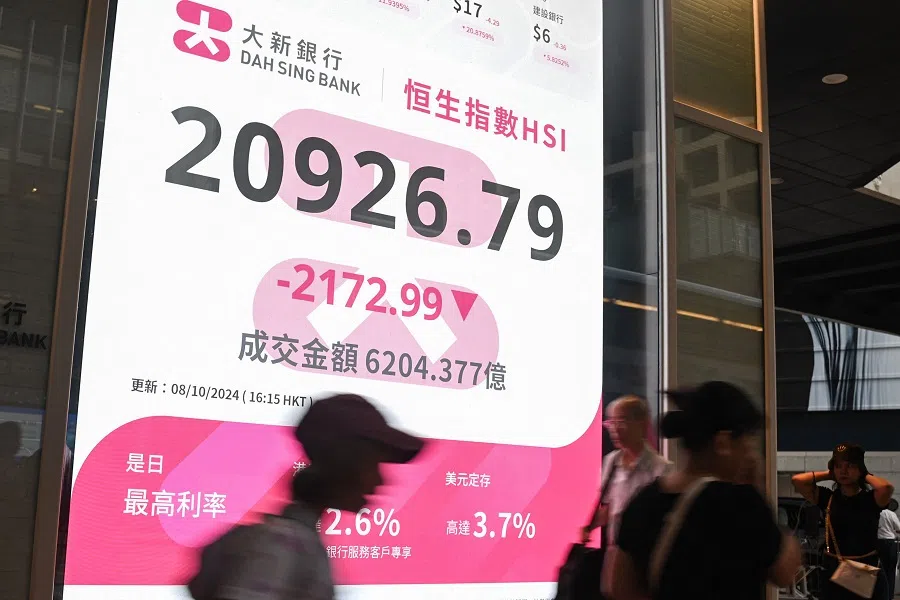Hong Kong vs Singapore: The battle for Asia’s wealth
Hong Kong aims to be the world’s top cross-border wealth hub, rivalling Switzerland. Despite slowed 2023 growth and competition from Singapore, with some wealth returning to Hong Kong due to Singapore’s limitations, optimism persists. Mainland businesses still favour Hong Kong for offshore setups, and emerging markets offer new growth potential. Can Hong Kong achieve its ambitious goal?

(By Caixin journalists Wang Xiaoqing and Zhang Yukun)
Can Hong Kong surpass Switzerland to become the world’s No. 1 cross-border wealth management centre?
“There are 2,700 single-family offices in Hong Kong, and the industry has predicted that Hong Kong will become the world’s largest cross‑boundary wealth management centre by 2028,” the city’s leader John Lee said in his 2024 policy address in October.
Lee was likely citing Boston Consulting Group’s (BCG) Global Wealth Report 2024, which predicted that Hong Kong would surpass Switzerland in the next few years.
Between Singapore and Hong Kong
The report argued that while growth in cross-border wealth in the city slowed to 3.2% in 2023 as flows from the Chinese mainland slowed — making it the worst performer among major global wealth management centres — strong growth may return if the city’s diversification strategies succeed.
The year 2023 saw more Chinese mainland wealth, which makes up more than 70% of Hong Kong’s cross-border wealth inflows, directed toward Singapore, the BCG report said.
In response, Hong Kong is focusing on family office services, technological innovation and improvements in market liquidity, according to the report.
Singapore has tightened its regulations for virtual assets and for family offices following money laundering scandals — possibly leading to more wealth being directed to Hong Kong to avoid regulatory scrutiny.

Despite the setback in 2023 and the challenges from Singapore, Hong Kong still possesses unique strengths.
It remains the first choice for many mainland businesses looking to set up offshore locations. Also, money from emerging markets such as the Middle East and Southeast Asia may soon become important sources of growth for its wealth management industry, according to industry experts.
Local businesses are also contributing to the city’s wealth market share. Hong Kong-based real estate agency Centaline Group launched a family office wealth management centre in July, aiming to help high-net-worth clients manage their wealth.
Meanwhile, Singapore has tightened its regulations for virtual assets and for family offices following money laundering scandals — possibly leading to more wealth being directed to Hong Kong to avoid regulatory scrutiny.
The Hong Kong government has been making efforts to facilitate wealth managers to set up investment funds in the city, and to ensure that its policy frameworks match or even surpass those of rivals such as Singapore.
Policy support
Hong Kong’s appeal as a wealth management centre is no accident. In part, it’s born from years of policy support aimed at attracting global portfolio managers.
The Hong Kong government has been making efforts to facilitate wealth managers to set up investment funds in the city, and to ensure that its policy frameworks match or even surpass those of rivals such as Singapore.

In July 2018, the city introduced the open-ended fund company (OFC) structure. That, for the first time, allowed a private open-ended fund to be established in Hong Kong as a corporate vehicle. Controls on the types of assets OFCs could invest in were subsequently scrapped, and the companies were given tax exemptions on some types of profit.
From early September 2023 to the end of September 2024, 271 OFCs were set up in Hong Kong, while the number of companies set up using a similar structure in Singapore was 177 during the same period.
The similarities between Hong Kong’s LPF structure and those in other jurisdictions such as the Cayman Islands and Singapore, along with its relatively low cost, made the city a competitive alternative.
In August 2020, Hong Kong launched the limited partnership fund (LPF) structure, which allows private investment funds to register locally as investment vehicles. Private fund managers often use LPFs to raise capital for investment. The similarities between Hong Kong’s LPF structure and those in other jurisdictions such as the Cayman Islands and Singapore, along with its relatively low cost, made the city a competitive alternative.
As of the end of September, the number of LPFs registered in Hong Kong reached 973, according to government data.
Jiang Jingjing, a partner at international law firm King & Wood Mallesons who participated in the establishment of the city’s LPF framework, said this number surpasses Singapore’s 801, despite the city-state introducing the structure way earlier. “That speaks to Hong Kong’s appeal as a place to set up funds,” he said.
Hong Kong eclipses Singapore?
The Hong Kong government began actively promoting the city’s family office services around June 2021, roughly two years after Singapore. As of the end of 2023, the estimated number of single-family offices in Hong Kong — more than 2,700 — was almost double Singapore’s 1,400.
Hong Kong eclipses Singapore in terms of the depth of its capital markets and the standard of its wealth management professionals. — Investors

Some investors pointed out that Hong Kong eclipses Singapore in terms of the depth of its capital markets and the standard of its wealth management professionals.
“Some of the wealth and personnel that flowed into Singapore from Hong Kong is returning,” one of them said, attributing this to a scarcity of investment targets and opportunities in Singapore.
But others have pointed to Singapore’s increased scrutiny of family offices and virtual assets as the major reason for money flowing back to Hong Kong.
Some experts believe that the number of family offices in Hong Kong will shrink due to competition, and that the city may also one day trade quantity for quality by tightening its regulations.
But for many wealth management industry insiders, investment decisions aren’t zero-sum.
Amy Lo, co-head of UBS’ Asia-Pacific wealth management business, told Caixin that the investment bank’s business operations in Hong Kong and Singapore are complementary.
Kwan Chi-man, CEO of Hong Kong-based Raffles Family Office, said many of the wealthy individuals he knows hold wealth management accounts in both Hong Kong and Singapore.
“They wouldn’t choose one over the other, because wealth management itself is about diversifying risks,” he said.
This article was first published by Caixin Global as “In Depth: After Bruising Year, Hong Kong’s Wealth Managers Have Reasons to Be Cheerful”. Caixin Global is one of the most respected sources for macroeconomic, financial and business news and information about China.




![[Big read] When the Arctic opens, what happens to Singapore?](https://cassette.sphdigital.com.sg/image/thinkchina/da65edebca34645c711c55e83e9877109b3c53847ebb1305573974651df1d13a)
